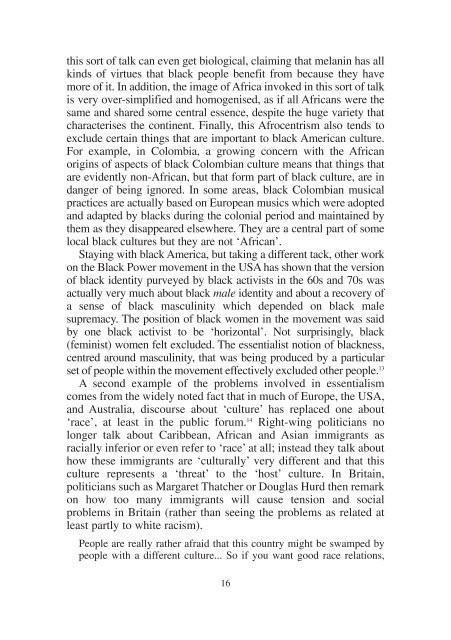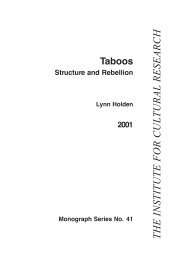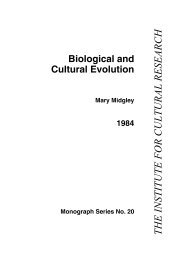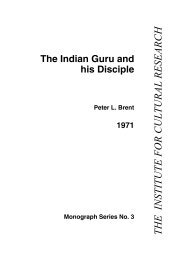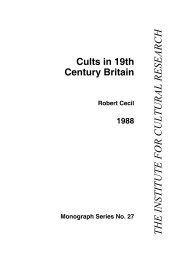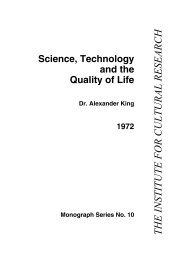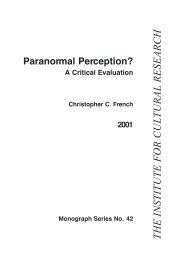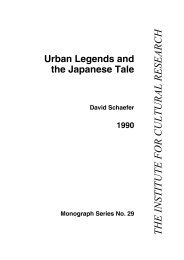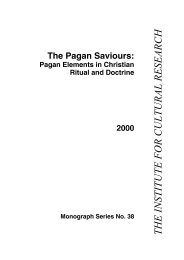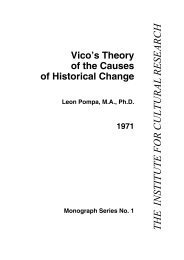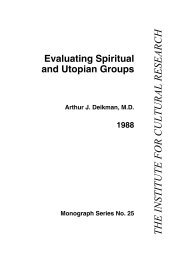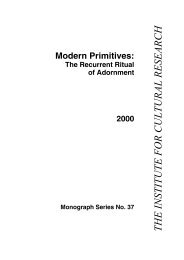Cultural Identity: Solution or Problem - The Institute For Cultural ...
Cultural Identity: Solution or Problem - The Institute For Cultural ...
Cultural Identity: Solution or Problem - The Institute For Cultural ...
Create successful ePaper yourself
Turn your PDF publications into a flip-book with our unique Google optimized e-Paper software.
this s<strong>or</strong>t of talk can even get biological, claiming that melanin has all<br />
kinds of virtues that black people benefit from because they have<br />
m<strong>or</strong>e of it. In addition, the image of Africa invoked in this s<strong>or</strong>t of talk<br />
is very over-simplified and homogenised, as if all Africans were the<br />
same and shared some central essence, despite the huge variety that<br />
characterises the continent. Finally, this Afrocentrism also tends to<br />
exclude certain things that are imp<strong>or</strong>tant to black American culture.<br />
F<strong>or</strong> example, in Colombia, a growing concern with the African<br />
<strong>or</strong>igins of aspects of black Colombian culture means that things that<br />
are evidently non-African, but that f<strong>or</strong>m part of black culture, are in<br />
danger of being ign<strong>or</strong>ed. In some areas, black Colombian musical<br />
practices are actually based on European musics which were adopted<br />
and adapted by blacks during the colonial period and maintained by<br />
them as they disappeared elsewhere. <strong>The</strong>y are a central part of some<br />
local black cultures but they are not ‘African’.<br />
Staying with black America, but taking a different tack, other w<strong>or</strong>k<br />
on the Black Power movement in the USA has shown that the version<br />
of black identity purveyed by black activists in the 60s and 70s was<br />
actually very much about black male identity and about a recovery of<br />
a sense of black masculinity which depended on black male<br />
supremacy. <strong>The</strong> position of black women in the movement was said<br />
by one black activist to be ‘h<strong>or</strong>izontal’. Not surprisingly, black<br />
(feminist) women felt excluded. <strong>The</strong> essentialist notion of blackness,<br />
centred around masculinity, that was being produced by a particular<br />
set of people within the movement effectively excluded other people. 13<br />
A second example of the problems involved in essentialism<br />
comes from the widely noted fact that in much of Europe, the USA,<br />
and Australia, discourse about ‘culture’ has replaced one about<br />
‘race’, at least in the public f<strong>or</strong>um. 14 Right-wing politicians no<br />
longer talk about Caribbean, African and Asian immigrants as<br />
racially inferi<strong>or</strong> <strong>or</strong> even refer to ‘race’ at all; instead they talk about<br />
how these immigrants are ‘culturally’ very different and that this<br />
culture represents a ‘threat’ to the ‘host’ culture. In Britain,<br />
politicians such as Margaret Thatcher <strong>or</strong> Douglas Hurd then remark<br />
on how too many immigrants will cause tension and social<br />
problems in Britain (rather than seeing the problems as related at<br />
least partly to white racism).<br />
People are really rather afraid that this country might be swamped by<br />
people with a different culture... So if you want good race relations,<br />
16


